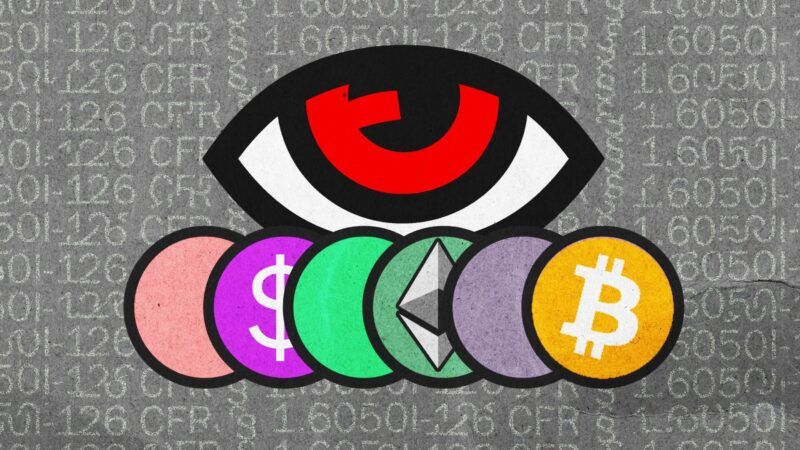Legislators Hid a Sneaky Crypto Reporting Provision in the Infrastructure Bill
It's even worse than the widely-skewered broker provision.

Imagine a crypto trader who does hundreds or thousands of transactions a day. What if he was legally required to collect personal data about every single person he does business with? Think of how burdensome that would be.
Or rather: Think of how burdensome that will be. Under a provision slipped into the new infrastructure bill, that's the law.
Section 6050I is a "long-forgotten statute" within the tax code, says Abe Sutherland, an adjunct at the University of Virginia School of Law and a fellow at the Coin Center. It requires people who transact large amounts of cash—above $10,000—to file reports to the IRS detailing the senders' names and Social Security numbers. The new law amends the rule to make it apply to cryptocurrency transactions.
This is "way more severe" than just adding friction, he says.
"All other tax code reporting violations are misdemeanors, but violation of 6050I can be a felony (up to five years in prison)," Sutherland notes on Twitter. "The law's relative clarity and limited applicability in the case of old-fashioned cash does not translate to digital assets. Compliance can be impossible."
If infra bill passes: a short story
Any American business: we received your payment of 0.243 bitcoin, thanks for your business! One last thing: give us your SSN, address, DOB, occupation, copy of passport or DL, and this other info Treasury Sec'y Yellen wants from you…
1/4
— Abraham Sutherland (@abesutherland) September 29, 2021
Congress passed 6050I way back in 1984, when practically the only people who used vast sums of cash for transactions were criminals. These days, big wads of $10,000-plus are rare, but transactions of that size involving bitcoin, ether, solana, or other cryptocurrencies are not. Imposing the rule on them could stymie widespread adoption of crypto by making it incredibly cumbersome to do business with it at all.
"Because this is technically a reporting provision, that allows people to say 'Oh, well, it doesn't ban it,'" but that misses a lot of the point, says Sutherland. The original provision was "designed to stop people from using cash," so they'd use banks instead. This provision could similarly compel crypto users to turn to the very financial institutions they're trying to free themselves from. After all, crypto's allure is partly due to the freedom users get from intermediaries.
Perhaps most importantly, there are significant concerns about whether the reporting provision is even constitutional at all. When applied to crypto, Section 6050I arguably constitutes unreasonable search and seizure. It's warrantless surveillance of an individual, who is now required to collect another individual's Social Security number. Multiple sources within the crypto world tell Reason they're prepared to challenge it in court.
The change to Section 6050I largely flew under the radar, as much of the cryptocurrency community was distracted by another measure in the same bill. This provision redefines broker to include "any person who (for consideration) is responsible for regularly providing any service effectuating transfers of digital assets on behalf of another person." As Will Wilkinson writes at Model Citizen, "This definition is so vague and broad that miners/validators, node operators, or even Axie breeders—none of whom are brokers in any recognizable sense—could conceivably fall within its scope, which would subject them to nonsensical and potentially ruinous broker tax reporting requirements."
Thankfully, the Section 6050I amendment won't take effect until January 1, 2024, which "gives us some time to try to get it changed, to get it repealed," says Jerry Brito, executive director of the Coin Center.
Brito objects not just to the rule change but to how it was pushed through. The language was added at the last minute to a $1.2 trillion infrastructure bill without normal, separate hearings, debate, and voting. "There's a whole process through which the issues get aired and unintended consequences become understood, and then members can vote with a full knowledge of the vote," says Brito. But that didn't happen. Many lawmakers may not have even realized that the change had been included in the bill.
"I don't think people realize quite yet the significance," Brito says.


Show Comments (24)